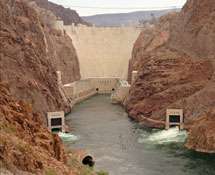
LAS VEGAS — The quagga mussel's invasion into the West will present some unique and costly problems, according to experts who still are assessing the extent of these recent infestations and how best to combat the exotic shellfish.
Colonies of the quagga mussel have already been found as deep as 200 feet in Lake Mead, and experts have determined that the mussels like the desert climate. At Lake Havasu, the exotic shellfish is reproducing six times a year, or three times faster than they do in the Great Lakes.
"This is an evil critter, not good," said Leonard Willett, quagga mussel coordinator on the lower Colorado River for the U.S. Bureau of Reclamation.
"It's going to cause a lot of problems as we have to install control measures."
During a Lake Mead Water Quality Forum, he theorized that maintenance and control at Hoover Dam on Lake Mead could cost $1 million a year, especially if hydroelectric cooling pipes get clogged with quaggas. The mussels could cause turbines to overheat and shut down until the pipes are cleared. Additionally, they could block intakes for water supply.
Willett explained that quaggas prefer to cling to flat, stainless steel where water flows slower than 6 feet per second. "Mussels really like stainless steel," he said. "They don't like copper or brass."
According to the Las Vegas Review-Journal, methods of control being considered include a "bacteria product" that specially targets quaggas. Mechanical filters, ultraviolet light and chemicals, including chlorine, are other options.
Farther down the Colorado River, quaggas are quickly colonizing around Davis Dam on Lake Mohave. Last fall, resource managers found them coating an exterior penstock gate "like carpeting."
At Parker Dam on Havasu, the mussels quickly blanketed sampling plates used to monitor them.
"At Parker Dam, there's a lot of colonization," Willett said. "At Parker, there is no hope. They colonize repeatedly."
